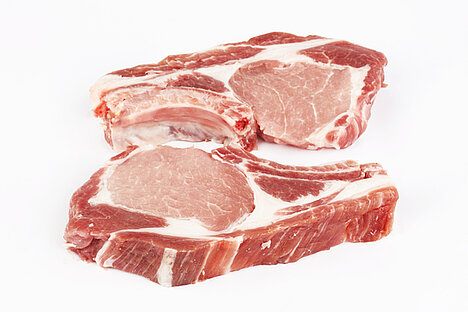Pig protein

What is pork protein?
Pig protein is an animal protein obtained from the meat or by-products of pigs. It can be processed either as fresh meat or as dried or hydrolyzed meat meal. Pork protein contains various amino acids that are essential for dogs, i.e. they cannot produce them themselves and must obtain them from their diet. These amino acids include, for example, isoleucine, leucine, lysine, methionine, phenylalanine, threonine and tryptophan.
What are the benefits of pork protein for dogs?
Pork protein has several benefits for dogs that can make it a useful addition to dog food. Firstly, pork protein is easily digestible, which means that it can be easily absorbed and utilized by dogs. Secondly, pork protein has a high biological value, which means that it can be easily converted by the dog into the body's own protein. Protein is an important building material for the dog's muscles, organs, bones, skin, coat, enzymes and hormones. Protein also supports the dog's immune system and metabolism.
What are the disadvantages of pork protein for dogs?
However, pork protein also has some disadvantages for dogs that you should be aware of. Firstly, pork protein can trigger allergies or intolerances, especially if it has been hydrolyzed. Hydrolyzed protein is a protein that has been broken down into smaller pieces to make it easier to keep or increase digestibility. However, this can also create new allergenic structures that are recognized as foreign by the dog's immune system. On the other hand, pork protein can contain too much fat, especially if it comes from by-products such as rind or offal. Too much fat in dog food can lead to obesity or digestive problems.
How much pork protein does my dog need?
The amount of pork protein your dog needs depends on various factors, such as his age, size, activity level and state of health. In general, however, your dog should get at least 10% protein by weight in their daily ration. So if you feed your dog a daily ration of 200 g of dry food, it should contain at least 20 g of protein. However, you should not only pay attention to the percentage of protein, but also to the quality of the protein. The quality of the protein is determined by its digestibility and biological value. Animal proteins usually have a higher digestibility and biological value than vegetable proteins. You should also make sure that the protein comes from a single or few sources and not from a mix of different types of meat or by-products. This makes it easier for you to recognize or avoid possible allergies or intolerances.
Pork protein is a possible source of protein for dogs that has some advantages, but also some disadvantages. It is easily digestible and has a high biological value, but can also trigger allergies or intolerances or contain too much fat. You should adjust the amount and quality of pork protein in dog food to your dog's individual needs and always look at the label to know what you are feeding your dog.
If you notice any signs of hypersensitivity or poisoning in your dog, you should see your vet immediately. We are not a substitute for a vet, but we try to be as accurate as possible. Every dog reacts differently and we recommend you get a second opinion or consult your vet if in doubt.
Stay healthy and take good care of your four-legged friend!😊